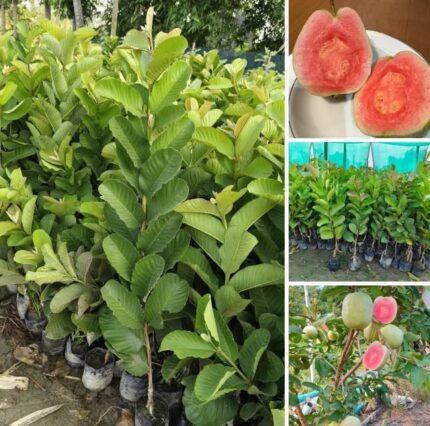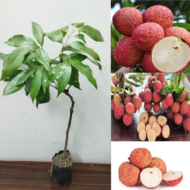General Features:
- Appearance: Hybrid litchis generally maintain the distinctive rough, red, and bumpy outer skin, but the skin texture and color may vary slightly depending on the specific hybrid cultivar. The flesh inside is translucent and juicy, with a sweet, slightly tart flavor.
- Size: Hybrid litchis often have larger fruit compared to regular varieties, sometimes with a thicker, firmer flesh and smaller seeds, improving the overall edible portion.
- Taste: While hybrids retain the sweet, floral flavor of traditional litchis, some varieties may have a more intense sweetness or milder acidity, depending on the cross.
Hybrid Litchi Varieties
There are several hybrid varieties of litchi that are cultivated for improved traits such as higher yield, better disease resistance, and fruit quality. Some common hybrid varieties include:
- Shahi Litchi:
- This hybrid is an improvement over traditional varieties, known for its large, round fruits with thicker flesh. It is often preferred for commercial production due to its high yield.
- China Litchi:
- A hybrid that blends characteristics of both the Chinese litchi and Indian varieties, offering better adaptability to different climates and resistance to pests.
- Bengal Litchi:
- Known for its resistance to fungal diseases, this hybrid is particularly suitable for cultivation in regions with high humidity and rainfall.
- Late-Season Hybrids:
- Some hybrid varieties of litchi are bred to extend the fruiting season, offering fruits well into the summer months, unlike traditional litchi varieties that are available only during the peak season (typically from May to June).
Growth and Cultivation in India
- Climate:
- Hybrid litchis grow best in tropical and subtropical climates with temperatures ranging from 25°C to 35°C. They require a cold winter (around 10°C to 15°C) to break dormancy and promote flowering.
- In India, litchis are mostly grown in states like Bihar, West Bengal, Uttar Pradesh, Assam, and parts of Jharkhand. The Muzaffarpur region in Bihar is particularly famous for its litchi production.
- Soil:
- Litchis prefer well-drained, loamy, or sandy soil with a slightly acidic pH (5.5 to 6.5).
- The soil should be rich in organic matter, which helps the tree grow vigorously and bear fruit.
- Watering:
- Litchi trees need consistent moisture, especially during the flowering and fruit-setting periods, but they do not tolerate waterlogging.
- Drip irrigation systems are widely used in commercial orchards to provide the trees with the necessary water without causing root rot.
- Pruning:
- Proper pruning is essential for hybrid litchi trees to maintain their shape, remove dead or diseased wood, and ensure proper sunlight penetration, which can lead to better fruit production.
Benefits of Hybrid Litchi
- Improved Fruit Size and Quality:
- One of the main goals of hybridization is to produce larger, more uniform fruit with better flesh-to-seed ratios, making the fruit more appealing for consumers.
- Higher Yield:
- Hybrid varieties typically have higher yields compared to traditional litchi trees, making them more profitable for farmers, especially in commercial farming.
- Disease Resistance:
- Some hybrid varieties are bred to be more resistant to common litchi diseases, such as fungal infections (e.g., Fusarium wilt) and pests like aphids and fruit flies, reducing the need for chemical interventions.
- Extended Shelf Life:
- Hybrid litchis tend to have a slightly longer shelf life compared to regular litchis, which makes them easier to transport over long distances without spoilage.
- Extended Fruit Harvest:
- Some hybrid litchi varieties are bred to mature later in the season, extending the availability of fresh litchis in markets beyond the traditional peak months.
Culinary Uses of Hybrid Litchi
- Fresh Consumption: Litchis are most commonly eaten fresh, with their juicy, aromatic flesh being a favorite summer treat in India.
- Desserts: The sweet and aromatic flavor of litchis makes them a popular ingredient in desserts like fruit salads, litchi ice cream, and fruit cakes.
- Juices and Beverages: Fresh litchis are often used to make refreshing juices, cocktails, or litchi-based syrups.
- Litchi-Based Dishes: In India, litchis are sometimes used in savory dishes, such as curries or as a garnish in biryanis, adding a touch of sweetness to balance spicy flavors.
- Preserves: Litchi is also used to make jams, jellies, and syrups, which can be enjoyed year-round.
Economic Importance in India
- Litchi is one of the major fruit crops in India, and hybrid varieties have contributed to the growth of the industry, especially in regions that face challenges such as pests and diseases.
- The domestic demand for litchi is high, particularly in the summer months, and India also exports litchis to countries like the Middle East, Europe, and parts of Southeast Asia.
- The cultivation of hybrid litchi varieties offers farmers a more reliable source of income by ensuring better fruit yield and quality.
Pests and Diseases
Like other varieties of litchi, hybrid litchis are susceptible to pests and diseases:
- Fruit Fly: A significant pest that can spoil the fruit and reduce marketability.
- Powdery Mildew: Fungal infections that can affect the leaves and fruit, reducing tree vitality and yield.
- Root Rot: Caused by poor drainage or excessive moisture, which affects the roots and ultimately harms fruit production.
Proper pest management, crop rotation, and maintaining tree health through pruning and regular soil care are important to ensure good yields.
Conclusion
Hybrid litchis offer a promising option for farmers in India who wish to improve their fruit yields and quality. By breeding litchis for enhanced traits such as larger fruit size, higher disease resistance, and extended harvest periods, hybrid varieties have the potential to revolutionize litchi farming. Their sweet, aromatic flesh makes them a popular choice for culinary uses, and their economic importance in India continues to grow.









Reviews
Clear filtersThere are no reviews yet.